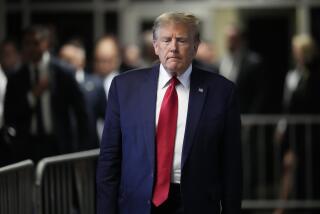Supreme Court majority leans in favor of limited immunity for Trump as an ex-president

WASHINGTON — The Supreme Court’s conservative justices said Thursday they agree a former president should be shielded from prosecution for his truly official acts while in office, but not for private schemes that would give him personal gain.
They also suggested the case against former President Trump will have to be sent back to the lower courts to decide which parts of the pending criminal indictment can proceed to a trial.
Trump was indicted on charges of conspiring to stay in office after losing the 2020 election, but the high court blocked the case from going before a jury to consider the ex-president’s claim of absolute immunity for his official acts while in the White House.
So far, Trump’s lawyers have been winning delays, and it appeared they may have done it again.
While the justices gave no hint they would endorse a total or absolute immunity for former presidents, they suggested that former presidents have an immunity for their official acts.
“Why shouldn’t we .... send [the case] back to the court of appeals [to sort it out]?” Chief Justice John G. Roberts Jr. said.
If the justices follow that approach, it will almost certainly prevent Trump’s trial from taking place before the November election.
The court’s three liberal justices predicted grave danger if the president is free to use official power with impunity.
What if the “president orders the military to stage a coup?” asked Justice Elena Kagan.
But the court’s conservatives said they worried about future presidents being targeted by their political opponents and prosecuted after they leave office.
The Constitution does not explicitly shield former presidents from being prosecuted for crimes while in office, and the Supreme Court has never ruled directly on the issue.
During Thursday’s argument, the justices said they were more interested in that historic and far-reaching issue, and less interested in the specifics of Trump’s pending indictment.
But if the conservative majority hands down a ruling in June that puts off Trump’s trial indefinitely, the justices, all of them Republican appointees, are likely to face sharp criticism from Trump opponents.
In a separate case in March, the justices ruled 9-0 that states and their judges may not use a provision of the 14th Amendment to keep Trump off the presidential ballot for having allegedly “engaged in insurrection” after the 2020 election.
Trump’s claim of absolute immunity has been derided by legal experts and rejected by a federal trial judge and the U.S. appeals court in Washington.
Lower courts have had little to say about a president’s immunity for official acts, and the Supreme Court surprised many by agreeing to rule on Trump’s appeal.
It was clear Thursday that most of the justices believe a president cannot be prosecuted after leaving office for his official decisions and actions in the White House.
Roberts and Justice Brett M. Kavanaugh served as White House lawyers, and they indicated they are wary of opening the door to former presidents being prosecuted after leaving office by the next administration. Both said they were concerned about politically driven prosecutions.
Veteran Justice Department attorney Michael Dreeben, who argued on behalf of special counsel Jack Smith, said the legal system has its own checks that would protect against partisan prosecutions, including grand juries that must approve indictments.
Roberts and Justice Samuel A. Alito Jr. scoffed at that.
“You know how easy it is in many cases for a prosecutor to get a grand jury to bring an indictment,” Roberts said.
Kavanaugh pointed to the era of independent counsels, and said the system made it too easy for presidents to be subject to long investigations and possible indictments. As a young lawyer, Kavanaugh worked for independent counsel Kenneth Starr and his long investigation of President Clinton.
“This case has huge implications for the presidency,” Kavanaugh said.
Justice Neil M. Gorsuch agreed. “I’m concerned about the future use of the criminal prosecutions to target political opponents,” he said.
The court’s liberals were more troubled about the prospect of future presidents being entirely shielded in the misuse of their power.
“If the president decides that his rival is a corrupt person and he orders the military or orders someone to assassinate him, is that within his official acts for which he can get immunity?” asked Justice Sonia Sotomayor.
Trump’s lawyer John Sauer replied that may well be “an official act” that is shielded from prosecution. He agreed presidents can be removed from office through impeachment while insisting that later criminal prosecutions are forbidden, unless the president is impeached and convicted.
Justice Ketanji Brown Jackson said she too worried about a future in which presidents know they need not follow the law.
“If someone with those kinds of powers, the most powerful person in the world with the greatest amount of authority could go into office knowing that there would be no potential penalty for committing crimes, I’m trying to understand what the disincentive is from turning the Oval Office into ... the seat of criminal activity in this country,” she said.
The special counsel had hoped the justices would rule quickly and clear the way for Trump’s trial to begin in the District of Columbia.
That seems quite unlikely now. The justices are likely to spend the next two months crafting an opinion that says a former president has immunity from being prosecuted for some official actions, but not for private and personal schemes that violate the law.
Both Roberts and Gorsuch said they favored sending the case back to the D.C. Court of Appeals so those judges could decide which parts of the Trump indictment can go before the jury.
More to Read
Sign up for Essential California
The most important California stories and recommendations in your inbox every morning.
You may occasionally receive promotional content from the Los Angeles Times.










